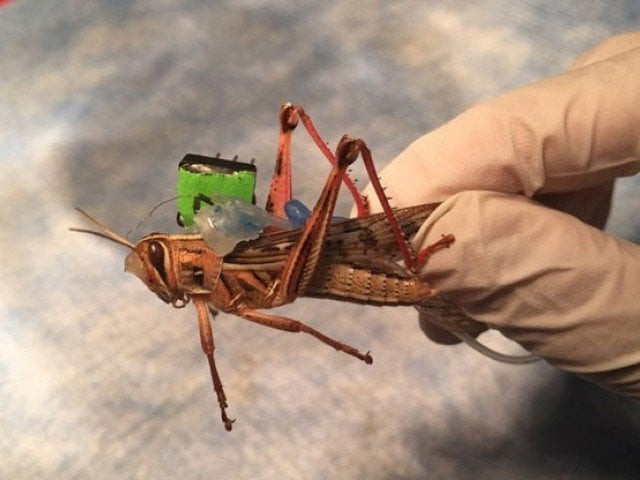China-Pakistan Trade Hotline: Chinese experts join hands with Pakistan in locust control
Suggest massive swarms need to be killed by pesticides with strong ability of sudden killing

Suggest massive swarms need to be killed by pesticides with strong ability of sudden killing. PHOTO: EXPRESS/FILE
Several insiders privy to the purchase information are doubtful about the operation mode of Malathion in Pakistan. Sino-Agri leading Biosciences Company Limited (SAL) occupies 80% of China's pesticide reserves for disaster relief. Hu Yijun, deputy manager of its raw pesticide department, told the China Economic Net that massive locust swarms need to be killed by pesticides with strong ability of sudden killing and knockdown.
He said, "The price of Malathion, the designated pesticide for air control operation, set at 30,000 yuan per ton, is very affordable. It breaks down after exposure to light and will be all right in two or three days. But except in extreme cases, there is no case of direct use of its raw pesticide in China."
Director of fine chemical project department of China National Chemical Information Centre (CNCIC) Luo Yamin pointed out that 95% Malathion that Pakistan would like to purchase belongs to raw pesticide, which is generally made into 45% or 70% formulation by adding additives and then used after being diluted with water.
"Even though the ULV on Pakistan's purchase list, ie the ultra-low volume dosage form, used for air control operation, has less water content, I have not heard that it is sprayed directly with the raw pesticide. As the raw pesticide is insoluble in water, difficult to be sprayed evenly and easy to drift, it can’t play a maximum role," he added.
Luo said that a high dosage of Malathion will kill the natural enemies of locusts as well as the locusts. "Locusts are natural species. Lack of natural enemies, locusts might be troublesome next year as well, but Pakistan at the current phase, have to use chemical methods to control locust swarms first.
“The biological pesticides commonly used in China, such as Microsporidia and Metarhizium, only take effect in two to three weeks. It's too late this time, but the effect will last 2-3 years. It's better to apply biological pesticides soon."
Integration of pesticide and equipment
Xu Yihua used to be the director of the Institute of Plant and Environment Protection in Beijing and now is general manager of Zhongnong Fengmao. The relief materials they produced - a total of 50 air-driven vehicle-mounted sprayers, commonly known as high-efficiency traction sprayers, as a representative of China's agricultural products, arrived in Karachi, Pakistan on April 24, 2020.
For this, the Department of International Cooperation, Ministry of Agriculture and Rural Affairs urgently coordinated the production resumption of Zhongnong Fengmao as priority amid the Covid-19 pandemic on February 21.
"The efficiency and effect of different pesticides and different dosage forms applied to the machine are different. How to use the least investment to achieve the maximum effect, that is, the integration of pesticide and equipment, is a big topic, which needs a lot of work," said Xu Yihua.
In the factory at Binhai New Area in Tianjin, Zhongnong Fengmao deputy general manager Sun Lulin shared that to get 50 high-efficiency traction sprayers for Pakistan suffering from locust plague during the pandemic in China, they spent nearly 20 days to transfer back more than a dozen equipment across the whole country, including Henan, Hebei, Inner Mongolia autonomous region and even Xinjiang Uygur autonomous region.
"At that time, there were only 30 machines in stock. We asked our clients one by one, and brought back equipment they didn't use temporarily and then repaired and maintained," he added.
The data show that in recent years, the number of UAV and the area of operation in plant protection have increased significantly. When the reporter asked about the application of UAV in locust control, Lulin held that the main problem of UAV was pesticide load capacity.
He suggested, "To control locusts, we should try our best to prevent and control pests in a large area as possible in a short period.
“The pesticide load capacity of UAV is mostly 10 to 20 kg, and the price of UAV with 100 to 200 kg load capacity is nearly one million yuan. The high-efficiency traction sprayer, with an operation area of 3,000 to 4,000 mu a day, sells for 128,000 yuan.”
Importing machinery
Pakistan's Minister of National Food Security and Research Syed Fakhar Imam once expressed his expectation for youth training cooperation between the two countries on May 7, calling on Chinese chemical companies to invest in Pakistan.
In this regard, Luo believes that as the amount of pesticide used in Pakistan is relatively small and Pakistanis mainly used in low-priced products such as Malathion, it's not a key market for pesticide companies.
Besides, the construction of the pesticide plant, which targets specifically at studying local habits of pesticide usage, shows an ordinary value of an investment.
"Being short of scale effect, it’s not cost-effective for Chinese chemical companies to establish plants in Pakistan, unless subsidies are in place," Luo said.
SAL chairman and general manager Su Yi believed that while it is easy to build a factory, the equipment for pesticide production and upstream intermediates should be matched correspondingly.
"Compared to buying spare and accessory parts from China, it is rather simple to import the complete machine. Besides, pesticide production is not suitable for places with high temperature," Su said, adding that "with such a good relationship between China and Pakistan, we can offer Pakistan a special and favourable price to achieve the same effect, and then help them train a team of agricultural technicians."
THIS ARTICLE ORIGINALLY APPEARED ON THE CHINA ECONOMIC NET



















COMMENTS
Comments are moderated and generally will be posted if they are on-topic and not abusive.
For more information, please see our Comments FAQ